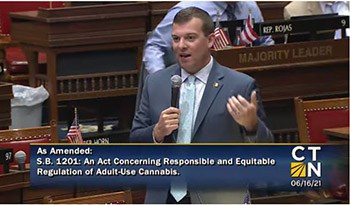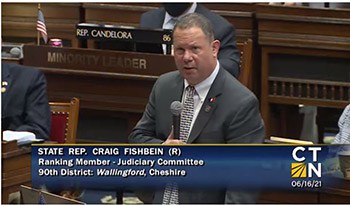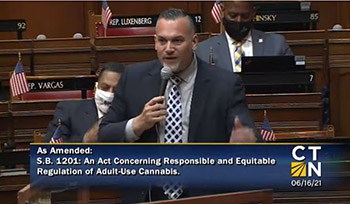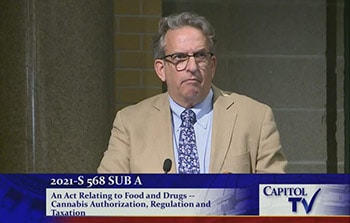
Rhode Island Capitol TV | ritv.devosvideo.com
More than a decade ago, Rhode Island state Sen. Joshua Miller chaired a commission that examined cannabis prohibition and the effects of what he called a failed policy.
That was in 2010. When Miller finally had the opportunity to introduce an adult-use cannabis bill Tuesday evening on the Senate floor, the upper chamber spent all of 15 minutes discussing the legislation before approving it in a 29-9 vote.
Sponsored by Miller and nine of his Democratic colleagues, Senate Bill 568 would allow adults 21 years and older to possess up to 1 ounce of cannabis or 5 grams of concentrate and grow up to six plants for personal use. The measure would also expedite the expungement process for those with misdemeanor cannabis records.
“It is a historic day, as it is the first time a bill to legalize and regulate cannabis has reached the floor of either legislative chamber in Rhode Island,” Miller said. “We have arrived at this point about 10 years later than I would have liked, and it is important that we act expeditiously to enact a regulatory framework.”
Miller pointed out that neighboring Connecticut Gov. Ned Lamont signed adult-use cannabis legislation earlier that day. And neighboring Massachusetts opened up shop for adult-use retail in 2018.
And with Vermont and New York’s legislatures legalizing cannabis in 2018 and 2021, respectively, Rhode Island and New Hampshire are the only two states remaining in New England where prohibition remains intact.
“The longer we wait, the more we put Rhode Island’s eventual cannabis retailers at a disadvantage,” Miller said. “The longer we wait, the more Rhode Island customers are getting into the habit of traveling to a nearby shop over the border, and the more they are building relationships with those companies. And with cannabis so readily available, whether on the black market or readily in neighboring states, Rhode Island must address all of the societal ills, but we will lack the regulatory framework and revenue stream. This legislation is therefore urgently needed.”
Under S.B. 568, cannabis use would be prohibited in public places and unsealed containers would be prohibited from the passenger areas of a motor vehicle.
The legislation aims to create a five-member Cannabis Control Commission to oversee a competitive and accessible licensing structure that Miller said would prevent monopolization of the new market by limiting business entities to one license. The licensing structure would generate tax revenue through a 7% sales tax, a 10% cannabis excise tax and a 3% local sales tax, which would return to municipalities where the point of sale occurred.
In addition, every community would be eligible for at least three retail licenses, but any municipality can opt out if it chooses. Communities can also pass local ordinances to regulate the time, place and manner of cannabis operators, however they cannot impose any additional fees or contingencies.
And on the social equity front, the legislation would create a fund to provide technical and grant assistance to qualified individuals who have been directly and indirectly impacted by prohibition. One-third of the licenses would be reserved for individuals from impacted communities.
“In the development of this bill, we wanted to ensure as many Rhode Islanders as possible have an opportunity to participate in this new economy,” Miller said. “That is why we set low barriers to entry with accessible tiered licensing fees.”
Licensing fees from the 11-tier system range from as low as $100 for up to 1,000 square feet of outdoor grows, to $5,000 for manufacturing and testing entities, and up to $20,000 for the largest cultivators and retailers.
While the bill passed by a 76% majority in the Senate, it competes with two other legalization measures: Gov. Dan McKee introduced a proposal in March that includes a three-year initiative to roll out retail licenses; and House Bill 6370 was introduced by Democratic Rep. Scott Slater on May 28.

Rhode Island Capitol TV | ritv.devosvideo.com
With the Senate-approved bill getting introduced in March, the upper chamber had the opportunity to make some really important improvements to it, Democratic Sen. Samuel Bell said Tuesday on the floor.
“That being said, I do think there are a couple things that the House bill does right that we might be able to modify,” he said. “I think we should make expungement automatic, and I think the tiering structure here is set up in such a way that it allows certain larger cultivators to potentially dominate the market. It’s something that I hope we can tweak. With that being said, I think it’s a really excellent piece of legislation.”
Republican state Sen. Gordon Rogers, who voted against the bill, said the legislation has two shortfalls. First, Rogers said the 3% local sales tax that will be returned to municipalities only takes dispensaries into account and not cultivators. In turn, cultivation-dominant communities absent of retail will be left out, he said.
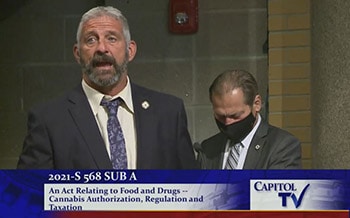
Rhode Island Capitol TV | ritv.devosvideo.com
Second, Rogers said he’s in favor of a central distribution facility that would act as a middleman between cultivators and dispensaries.
“Let’s say something happens with a fungus or something; it’s growing, it’s a public health issue, you have a central place to find out where it’s coming,” he said. “If it’s coming from growers shooting off the dispensaries, it’s kind of erratic. But if you have a central distribution hub where this can be followed, [there is] control and testing.”
Miller said authors of the bill considered such a distribution center but decided not to go with that concept because of what they observed at operations of retailers in Massachusetts.
“Some of them actually only use maybe one or two cultivators,” Miller said. “And so, the central distribution would just be another security component that would be a burden both to the cultivator and the security, and the tagging and the tracking that you want to go through with the marijuana.”
S.B. 568 will now go to the House for consideration, although only a week remains before the Legislature adjourns June 30. Earlier this month, House Speaker Joe Shekarchi told WPRI-TV that the lower chamber would focus on passing a budget first and possibly push back adult-use cannabis legislation to a special session later this year.
But the Senate’s approval of S.B. 568 on Tuesday is just another example of the momentum behind the nationwide movement to end prohibition, National Organization for the Reform of Marijuana Laws (NORML) Executive Director Erik Altieri said in a statement.
“The American people are sick and tired of our failed prohibitionist policies and finally their elected officials are enacting the will of their constituents,” he said. “We call upon the Rhode Island General Assembly to follow the Senate’s lead and quickly approve this bill.”







